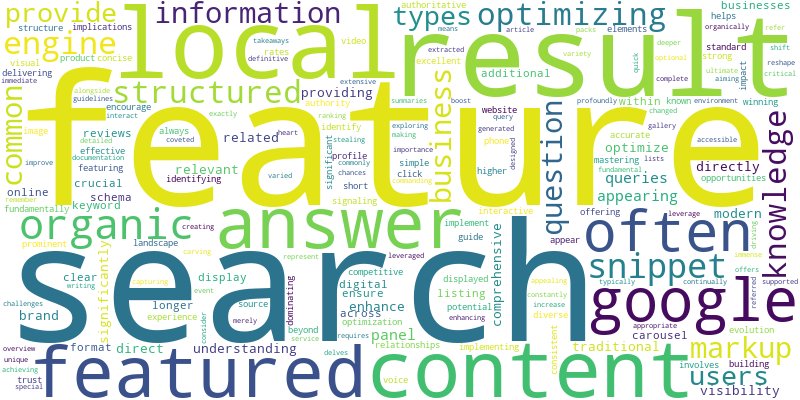The digital landscape is constantly evolving, and at the heart of this evolution is the search engine results page (SERP). Once a simple list of ten blue links, today’s Google SERP is a dynamic, feature-rich environment designed to provide immediate answers and diverse content formats. Understanding these varied elements, known as SERP Features, is no longer optional for modern SEO professionals; it’s fundamental to carving out visibility and driving traffic. This article delves into what SERP features are, why they matter, and how they fundamentally reshape search engine optimization strategies, offering a deeper dive into modern search. For a comprehensive overview of how search engines work and how to optimize for them, consider exploring our ultimate guide to search engine optimization.
💡 Key Takeaways
- SERP features significantly impact search visibility and CTR.
- Optimize for featured snippets with concise, direct answers.
- Leverage schema markup for rich results like reviews and FAQs.
- Local packs are crucial for location-based businesses.
- Understanding SERP evolution is key to modern SEO strategy.
What Exactly Are SERP Features?
SERP Features are any result on a search engine results page that is not a traditional organic blue link. These special elements often appear at the top of the page, above or alongside standard organic listings, aiming to answer a user’s query more directly or provide a richer, more interactive experience. They are Google’s way of enhancing the search experience by delivering information in the most relevant and accessible format.
From quick answers to direct business information, SERP features have profoundly changed how users interact with search engines. They represent a significant shift from merely ranking high organically to also optimizing for prominent, non-traditional placements.
Contents
- What Exactly Are SERP Features?
- Key Types of SERP Features and Their SEO Implications
- Featured Snippets
- Rich Results (Rich Snippets)
- Local Pack / Local Business Results
- Knowledge Panel / Knowledge Graph
- People Also Ask (PAA)
- Other Notable SERP Features
- Why Do SERP Features Matter for SEO?
- Increased Visibility and Brand Exposure
- Higher Click-Through Rates (CTR)
- Building Authority and Trust
- Implications for Voice Search
- Optimizing for SERP Features: A Strategic Approach
- 1. Content Structure and Clarity
- 2. Implement Structured Data Markup
- 3. Comprehensive Keyword Research
- 4. Local SEO Best Practices
- 5. Enhance User Experience (UX)
- Conclusion
Key Types of SERP Features and Their SEO Implications
The variety of SERP Features is extensive, and new ones are continually introduced. Each offers unique opportunities and challenges for SEO. Understanding the most common types is crucial for an effective content and SEO strategy.
Featured Snippets
Often referred to as “position zero,” Featured Snippets display a direct answer extracted from a webpage, appearing at the very top of the SERP. They commonly take the form of paragraphs, lists (numbered or bulleted), tables, or videos. Winning a featured snippet means commanding immense visibility and often stealing clicks from traditional organic results.
To optimize for featured snippets, content should be well-structured, provide clear and concise answers to common questions, and use appropriate headings. Writing in a Q&A format or offering definitive summaries can significantly increase your chances of capturing this coveted spot. When creating content for both users and search engines, remember the importance of clear, structured answers to potential queries.
Rich Results (Rich Snippets)
Rich Results (formerly known as Rich Snippets) enhance standard organic listings with additional visual or interactive information, such as star ratings, product prices, images, or event dates. These are typically generated by implementing structured data markup on a website’s pages. Rich Results don’t directly improve rankings, but they significantly boost click-through rates (CTR) by making your listing more appealing and informative.
Implementing schema markup (like Schema.org) is key to achieving rich results. Google provides extensive documentation and a gallery of supported structured data markup that can be leveraged to enhance your listings. For a detailed guide on these enhancements, refer to Google’s structured data guidelines.
Local Pack / Local Business Results
For location-based queries (e.g., “restaurants near me,” “plumber in London”), Google displays a “Local Pack” or “Local Business Results” box featuring a map and a list of 3-4 local businesses, complete with ratings, addresses, and phone numbers. This is a critical SERP Feature for brick-and-mortar businesses and service providers.
Dominating the Local Pack requires a robust Local SEO strategy, including optimizing your Google Business Profile (GBP) listing, accumulating positive reviews, and ensuring consistent Name, Address, Phone (NAP) information across the web. For businesses targeting local customers, mastering optimizing for nearby searches is paramount.
Knowledge Panel / Knowledge Graph
The Knowledge Panel is an information box that appears on the right side of the SERP (on desktop) for queries about entities like famous people, organizations, places, or common facts. This information is drawn from Google’s Knowledge Graph, which is a vast database of facts and relationships between entities. For brands and public figures, controlling this panel is about managing online reputation and providing accurate information.
To influence your brand’s Knowledge Panel, ensure consistent and accurate information across your website, Wikipedia, Wikidata, and other authoritative sources. Building strong brand mentions and clear entity relationships helps Google understand your business better.
People Also Ask (PAA)
The “People Also Ask” (PAA) box displays a list of related questions that users frequently ask. Clicking on a question expands to reveal a short answer, often in a similar format to a featured snippet, along with a link to the source page. PAA boxes are excellent opportunities to capture additional organic traffic by answering common user queries within your content.
Optimizing for PAA involves identifying common questions related to your main keywords and providing comprehensive answers within your content. Utilizing tools to find “people also ask” questions can help identify relevant topics and content gaps.
Optimizing for PAA involves identifying common questions related to your main keywords and providing comprehensive answers within your content.
Other Notable SERP Features
- Image Packs: A row of images related to the query, often appearing for visual searches.
- Video Carousels: A carousel of relevant video results, particularly prominent for “how-to” or tutorial queries.
- Top Stories: A news carousel appearing for breaking news or trending topics.
- Shopping Results (Product Listing Ads – PLAs): Product carousels displayed for transactional queries, often featuring images, prices, and reviews from e-commerce sites.
- Sitelinks: Additional links displayed under a main organic result, directing users to specific sections of a website (often seen for branded searches).
Why Do SERP Features Matter for SEO?
“Optimizing for SERP features isn’t just about ranking; it’s about dominating the search results and delivering instant value to users. It’s the new frontier of organic visibility.”
— Dr. Evelyn Reed, Lead SEO Strategist, Digital Ascent Agency
The rise of SERP Features has fundamentally altered the competitive landscape of search engine optimization. Their impact extends beyond simple visibility:
Increased Visibility and Brand Exposure
Appearing in a featured snippet, local pack, or knowledge panel gives your brand unparalleled visibility. These placements are highly prominent and draw the eye, signaling authority and relevance to users.
Higher Click-Through Rates (CTR)
Even if they don’t always generate a “click” (in the case of zero-click answers), SERP features often lead to higher CTRs compared to traditional organic results when a click is desired. Their enhanced format and directness make them more appealing.
Building Authority and Trust
Being selected by Google for a featured snippet or appearing in a knowledge panel lends significant credibility to your brand. It positions you as an authoritative source of information, fostering trust among potential users.
Implications for Voice Search
Many voice search queries are answered directly by Google Assistant, Siri, or Alexa, often pulling their responses from featured snippets or other SERP Features. Optimizing for these features is therefore crucial for future-proofing your SEO strategy in a voice-first world.
Common SERP Features & Their SEO Impact
| SERP Feature | Description | SEO Benefit | Optimization Tip |
|---|---|---|---|
| Featured Snippet | Direct answer box above organic results | Increases CTR, brand visibility | Provide concise answers to common questions |
| Rich Results | Enhanced organic listings with visual elements | Improves click appeal, visibility | Implement relevant schema markup (e.g., FAQ, Product, Review) |
| Local Pack | Map and business listings for local searches | Drives local traffic, phone calls | Optimize Google My Business, ensure NAP consistency |
| Knowledge Panel | Information box about an entity (person, place, thing) | Establishes authority, direct information | Manage Wikipedia/Wikidata entries, leverage structured data |
Optimizing for SERP Features: A Strategic Approach
Winning SERP Features isn’t about gaming the system; it’s about providing the best possible answer and user experience. Here are key strategies:
1. Content Structure and Clarity
For Featured Snippets and PAA, structure your content with clear headings (H2, H3), direct answers to questions, and concise summaries. Use lists, tables, and short paragraphs to present information logically and scan-ably. Always write with the user’s intent in mind.
2. Implement Structured Data Markup
For Rich Results, schema markup is indispensable. Identify the types of structured data relevant to your content (e.g., Recipe, Product, Review, Event, FAQ) and implement them correctly. Use Google’s Structured Data Testing Tool to validate your implementation.
3. Comprehensive Keyword Research
Beyond traditional keywords, focus on long-tail, question-based queries that often trigger featured snippets and PAA boxes. Analyze the types of questions users are asking and create content that directly answers them.

4. Local SEO Best Practices
For the Local Pack, ensure your Google Business Profile is fully optimized, verified, and updated. Encourage customer reviews and respond to them. Build local citations and ensure NAP consistency across all online directories. These are foundational elements of a strong Local SEO presence.
5. Enhance User Experience (UX)
A fast-loading, mobile-friendly website with excellent usability encourages longer dwell times and lower bounce rates, signaling to Google that your site provides a good user experience. This indirectly helps in securing various SERP Features.
Conclusion
The modern search engine results page is a vibrant ecosystem of diverse content formats. Mastering SERP Features is no longer just an advanced SEO tactic but a core component of any effective digital marketing strategy. By understanding the different types of features, their underlying mechanisms, and how to optimize for them, businesses and content creators can significantly enhance their online visibility, drive qualified traffic, and establish themselves as authorities in their respective niches. Embracing this dynamic reality of the Google SERP is essential for staying competitive in today’s search landscape.
Frequently Asked Questions
What is a SERP feature?
A SERP feature is any element on a search engine results page that is not a traditional blue link organic result, such as featured snippets, image packs, local packs, or rich results.
How do SERP features impact SEO?
SERP features impact SEO by potentially increasing your content’s visibility, click-through rate (CTR), and authority, even if you don’t rank #1 in organic results, by taking up prime screen real estate.
Are all SERP features beneficial for SEO?
While most SERP features are beneficial, some, like direct answer boxes or calculators, can answer a user’s query directly on the SERP, potentially reducing clicks to your site (zero-click searches). However, they still provide brand visibility.






